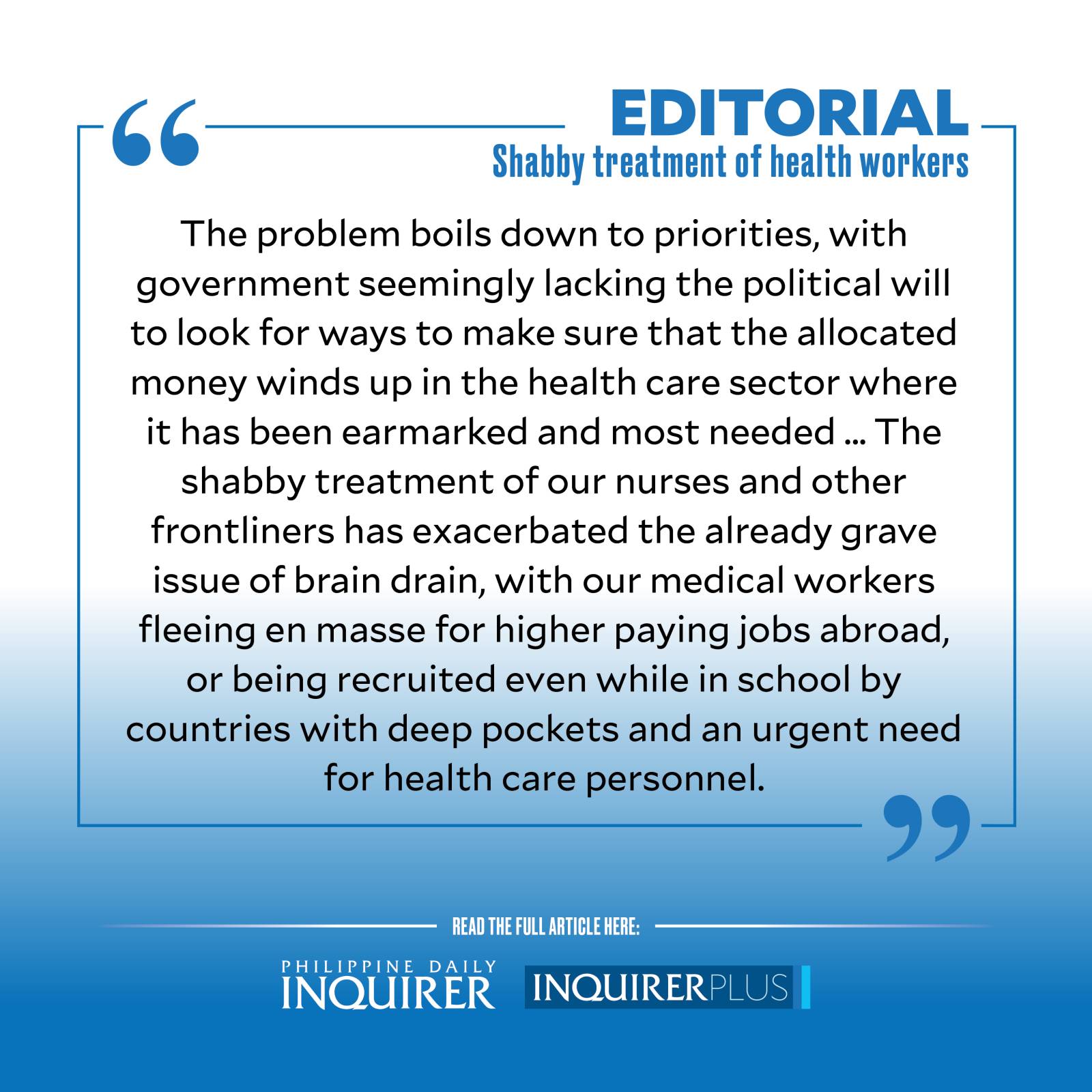Shabby treatment of health workers
Like a bad case of deja vu, COVID-19 cases are again on the rise, pushing the positivity rate—or the percentage of people who test positive out of those tested—to more than double the 5-percent threshold set by the World Health Organization to indicate that virus transmission is under control.
According to Octa Research fellow Dr. Guido David, the positivity rate as of April 25 in the National Capital Region escalated week-on-week to 12.3 percent from 8.1 percent. This could be due to the presence of the Omicron subvariant XBB 1.16 that is likely spreading across the country, he noted. Hospital occupancy rate however remains low at 16 percent, said the Department of Health (DOH), allaying fears of a return to extended quarantines and lockdowns. At least, not yet.
Article continues after this advertisementSuch scenario would mean we’d again need the services of medical frontliners who have put themselves in harm’s way to control the spread of the virus since it first manifested on local shores in 2020. But how can we expect them to face such risk anew when they’re still waiting—hopefully not in vain—for what has been due them since October 2021?
According to the United Private Hospital Unions of the Philippines (UPHUP), as many as 20,304 health care workers who served in private hospitals at the height of the pandemic have yet to receive their mandated allowances that total P1.94 billion. The long-delayed arrears represent the promised special risk allowance; the one COVID-19 allowance; health emergency allowance; and meals, accommodation, and transportation benefits. Covered here are health care workers in 23 hospitals in Metro Manila as well as Batangas, Cavite, Cebu, and Davao del Sur.
While the DOH has committed to work with the Department of Budget and Management to fast-track the release of these overdue COVID-19 benefits, that promise has yet to be redeemed. Simply put, the government has not provided the full funding needed to meet the pandemic benefits for services already rendered, and in many cases at great cost to these frontliners’ mental and physical health.
Article continues after this advertisementAccording to the UPHUP, only about 64 percent of the P41.9 billion pandemic funds for health care workers under the General Appropriations Act had been disbursed as of April 5. The problem boils down to priorities, with government seemingly lacking the political will to look for ways to make sure that the allocated money winds up in the health care sector where it has been earmarked and most needed. In contrast, legislators have pulled out all stops to make sure that controversial, audit-free intelligence funds are in place in favored agencies. The delay in paying out the benefits of health care workers does not reflect well on the Marcos administration that had repeatedly promised better treatment of medical frontliners, and on DOH officer in charge Maria Rosario Vergeire, who has indicated that she is now ready to take over the health portfolio.
Whoever gets the job should be ready to prioritize the cause of health workers, as failure to do so would have dire consequences. Paying the pandemic allowances should be priority No. 1 for the new DOH secretary.
Indeed, the shabby treatment of our nurses and other frontliners has exacerbated the already grave issue of brain drain, with our medical workers fleeing en masse for higher paying jobs abroad, or being recruited even while in school by countries with deep pockets and an urgent need for health care personnel. A new report from the International Council of Nurses in fact said that the worldwide shortage of nurses should be treated as a “global health emergency,” since health systems around the world are struggling under the strain of securing sufficient workforce in the demanding medical field. Many countries have turned to the Philippines, which has earned a reputation as one of the world’s biggest exporters of nurses. As President Marcos himself said, “our nurses are the best. We are competing with the rest of the world for them.”
Sadly, this means that while the country readily churns out medical frontliners, it has become increasingly difficult to get them to stay and work in the Philippines. The delay in COVID-19 payments isn’t helping any, as it seems to indicate the government’s lack of respect and appreciation for them. How can they be expected to forego better opportunities in foreign shores when their basic right to benefits already funded are being frustrated every step of the way? As a result, between a better future abroad and shoddy treatment at home, the choice for far too many medical frontliners is obvious though still a painful and costly one—for them and the rest of us.

















